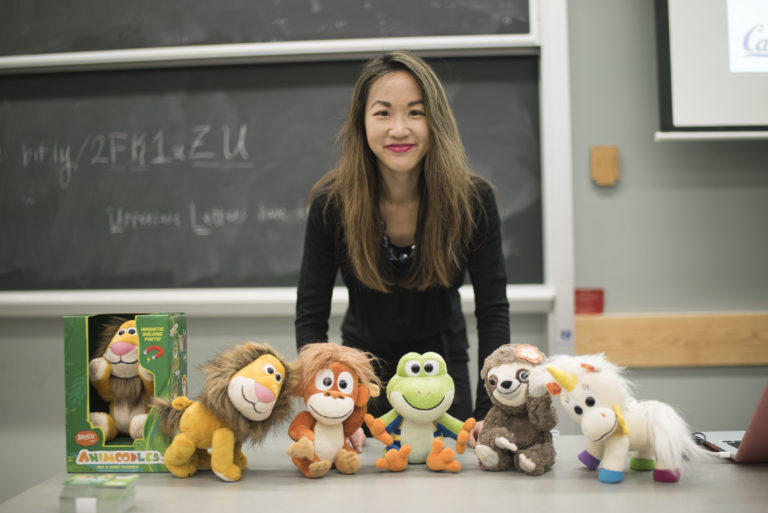The Hidden Social Mission Driving This Cal Alumna’s Trending Toy Startup

Last week, there was an unusual sight in UC Berkeley’s Industrial Engineering 185 course: stuffed animals.
The toys, called Animoodles, put an innovative twist on the traditional plushie. As students passed them around the class, they found that hidden magnets allowed them to pop off each toy’s head or limbs and mix and match parts with other types of animals. Some put the head of a unicorn on a sloth or switched a lion’s limbs with those of a frog.
But the students soon learned that these toys are more than just a new take on what a stuffed animal can be –– they also have a distinct humanitarian mission. On Thursday, CEO and Chief Designer of Animoodles, Marissa Louie, joined the Sutardja Center for Entrepreneurship & Technology Challenge Lab class on disaster recovery in Puerto Rico, to give advice to students on how they can design products to have a social impact.
“A lot of people don’t know the whole reason behind Animoodles because we want the product to speak for itself,” Louie said. “Today is the first time I’m going to tell a room full of people what that really is.”
Louie is a UC Berkeley alumna who earned a degree in industrial engineering, business and economics. But beyond the practical knowledge that she gained at the UC Berkeley, she said that her time at the university laid the foundation for her critical thinking, morals and ethics as an entrepreneur.
It’s because of a desire for social change that she developed while at UC Berkeley, Louie said, that she felt she wasn’t fulfilling her true purpose when she started working as a designer for large tech organizations like Yahoo and Apple after college.
So after about a decade working in the tech industry, Louie switched gears to follow her dream of creating a toy that would promote diversity, inspire creativity and build the next generation of “little makers.” Louie explained that the mix-and-match design of Animoodles is key not only to the unique draw of the toy, but also to the company’s social mission.
“With Animoodles, you can literally have an animal walk a day in another animal’s shoes,” Louie said. “We want to instill these values in kids, and we can use Animoodles as a model to do so.”
Louie added that Animoodles are a way to get children away from screens and back to a type of playing that inspires them to use their imaginations. She noted that kids’ ability to switch around animals’ heads and limbs around builds an early interest in creating new things.
But building a stuffed animal that competes with the many digital toys on the market wasn’t easy –– Louie started the project completely on her own and had to teach herself how to market products, how to design a package and how to illustrate, among many other skills.
After a year working on Animoodles by herself, she brought a rough prototype –– a teddy bear that she sewed herself –– to Pixar character designer, Dan Holland. He agreed to join the project and helped develop specific characters for the toys, like Randy Orangutan, Hazel Sloth, Miguel Frog and Iris Unicorn.
Since then, the project raised $100,000 on Kickstarter and launched in October 2017. A month later, Animoodles were named the number one trending toy in the world during Black Friday and Cyber Monday.
Beyond the social mission that emerges within the toy’s design, a major tenant of the Louie’s business model is giving back. When the U.S. government threatened to lift a ban on the import of elephant tusks, Animoodles introduced a new character on their website, Sophie the Elephant, and gave 100 percent of profits from the toy to the African Wildlife Foundation.
During the class, Louie stressed the importance of using for-profit companies as a way to make money to donate back to philanthropic causes. She encouraged students to use their own personal strengths to build products that promote humanitarian causes, just as she did with her design expertise.
“Working at a job to just get a paycheck is not enough anymore,” Louie said. “You can use your skills to make a happier world.”
This story was originally posted at the Sutardja Center for Entrepreneurship & Technology here. Their new Challenge Lab Course on disaster and recovery in Puerto Rico encourages students to find innovative ways to solve the problems facing Puerto Rico in the wake of Hurricane Maria.